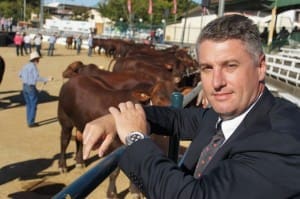High operating costs and labour shortages are the biggest challenges facing Australian agriculture, industry leaders warned yesterday, with companies looking to set up more offshore processing operations to save money.
Delegates attending The Australian newspaper’s Global Food Forum in Sydney yesterday were told by beef, dairy, and nut industry leaders that “horrific operating costs” needed to be addressed for Australia to take full advantage of growing demand for food products from Asia.
JBS Australia chief executive Brent Eastwood said processing costs for boxed beef in Australia were between 1.5 and three times higher than in competing beef export nations including New Zealand, the US and Brazil, JB Swift’s home market.
“Our labour costs are massive – utility costs, infrastructure costs, red tape, country restrictions. All these things ‘cost’, and unfortunately in this sector, the cattle producer ultimately takes the hit for that,’’ The Australian reported Mr Eastwood as saying.
He said the Australian industry needed to focus on higher productivity to overcome the cost hurdles and “clean, green” branding, for which consumers will pay higher prices.
“There’s no point in just taking a little cent here and a cent there. That’s not going to change how we run this country. We need to look at sizeable ways to remove cost from the process in this country. It’s not going to be enough.”
Mr Eastwood and Australian Agricultural Co director David Crombie said their companies were turning to imported labour to counter labour shortages, with local people unwilling to pursue jobs in the meat-processing industry, despite the high wages.
Consolidated Pastoral Co chief executive Troy Setter said competitiveness was a “challenge.’’
“We can push hard on a quality brand and a brand Australia, which is very important to do, but if our cost of production to process a carcase into a box is three times that of competitors in Brazil, we have got to address that,’’ Mr Setter said.
Calls for reforms to reduce costs and lift productivity came amid booming prices for soft commodities such as milk, which has soared in price following demand from China for safe supplies; and for beef, which has moved to $4 per kilo liveweight in some importing countries, on surging demand and a prolonged drought in the US that has devastated herd numbers there.
Anthony Pratt, the chairman of major packaging manufacturer, Visy Industries, said food exports from Australia had grown by 26 percent in the past three years. The total value had reached $36 billion and was on a trajectory to overtake iron ore exports, which have fallen sharply in value as BHP Billiton and Rio Tinto flood the market with new production.
After a rash of corporate activity in the dairy industry last year, investment banker David Williams of Kidder Williams predicted foreign and local buyers’ interest would shift to the beef and horticulture industries, where company valuations are lower and demand is still growing.
Click this video link to see a clip of Troy Setter outlining the current state of the Australian cattle market.
Source: The Australian. The Australian’s Global food forum was not open to general media. Click here to view The Australian’s original report.





HAVE YOUR SAY